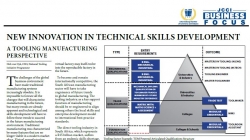New Innovation In Technical Skills Dvelopment - Dirk van Dyk2017-09-22 A Tooling Manufacturing Perspective
The challenges of the global business environment have made traditional manufacturing systems increasingly obsolete. It is impossible to foresee all the changes that will characterize manufacturing in the future, but many trends are already apparent and technological and skills development will have to follow these trends to succeed in the future manufacturing environment. Traditional manufacturing was characterized by many features that are no longer viable in a modern market place. Virtual manufacturing systems will be extremely agile, but they will also be intelligent. They will not only ensure rapid response, but integrate customers within design, testing, and service delivery. Work will be more flexible and knowledge intensive than ever before. Scientific and technical knowledge will be driving product and process innovations. Work will therefore require a much greater degree of technical skills and experience, problem solving, multi-tasking, teaming and collaboration. The virtual factory may itself evolve into the reproducible factory in the future. To become and remain internationally competitive, the South African manufacturing sector will have to take cognisance of future trends in global manufacturing. The tooling industry, as a key support function of manufacturing should be re-engineered to align among others the local skills and enterprise development model to international best-practice standards. The direct tooling industry in South Africa, which represents a R15 billion market, suffers from an endemic skills shortage. South Africa’s manufacturing and Tool, Die and Mouldmaking (TDM) sector skills pipeline suffered a few cycles with very little input and output from the existing educational system contributing to the skills gap. South Africa has over the past 25 years lost considerable tooling capacity. Local companies satisfy less than 15% of the local and less than one per cent of global TDM demand as they have failed to adopt the technology and production efficiencies of their developed counterparts. Ageing skills capacity in the sector was not replaced timeously, which led to a serious skills shortage in the TDM industry. Since its onset a few years ago the Intsimbi National Tooling Initiative (a multi-stakeholder initiative initiated by the Toolmaking Association of SA (TASA) and the Department of Trade and Industry (the dti) sought to not only halt the decline of the sector but to embark on a robust rehabilitation programme. At the core of the initiative are the TDM Powered Skills Development and Enterprise Development Programmes. The programmes aim to upgrade local tooling companies to world class competitiveness levels. The TDM Programmes are, however, confronted by many challenges presented to human resource development by reindustrialisation. Rapid technology implementation acceleration places very high demands on companies to multi-skill their workforce, retain skilled workers, and to create a constant supply to meet growth demands. The imbalances in skills development and supply are caused by the retirement of millions of experienced and knowledgeable workers globally, technology advancement, misalignment of competencies required and outdated training and apprenticeship models. It is estimated that more than ten million manufacturing sector jobs are unfilled globally due to skills gaps. It is obvious that old training models with straight educational hours and a lack of uniform industry standards will have to make place for a competency-based approach aligning the knowledge and skills requirements of industry. Modularity, stackability and international standards will be key characteristics. The NTI Pilot Programme â€" 2010 to 2022 was therefore introduced to pilot the advanced manufacturing sector solutions required for skills, enterprise development and transformation. The aim of the TDM Enterprise Development Programme is to take existing businesses on a successful journey to transformation into internationally competitive re-industrialised businesses. The three-pronged approach comprises a global standard comprehensive benchmarking exercise, evaluating company performance against local and international peers, intervention projects and re-benchmarking. Intervention includes comprehensive consulting projects aimed to derive measures directing towards international competitiveness. The Programme furthermore has a strong focus on the development of young industrialists by means of additional exit/entry and funding support and assistance with ownership migration. It facilitates black ownership buy-in/buy-out and skills transfer support. Without an innovative approach to future enterprise and skills development in the manufacturing and tooling sectors in South Africa the closing of the skills gap is unlikely. Significant growth and global competitiveness will remain a pipedream. South Africa’s manufacturing sector needs a revival on the back of an aggressively modernising and growing tooling sector, supported by an international standard technical skills pool. Skills and enterprise development remain key components and will play a pivotal role in the tooling and manufacturing industry’s growth plans. The creation of a national supply line of highly skilled workers from entry level to post graduate MSc and PhD tooling support engineers will ensure future SUSTAINABILITY of innovation and competitiveness improvement in the SA Tool, Die, Mould and Advanced manufacturing sectors. This will lead to a new generation of young entrepreneurs and business owners who will transform the SA tooling and manufacturing sectors to become a significant supplier into global supply chains. For more information contact Dirk van Dyk, dirkvd@ntipweb.co.za Cell: 082 904 3327 www.ntipweb.co.za Back to overview |
New Innovation In Technical Skills Dvelopment - Dirk van Dyk
Copyright © 2024 KwaZulu-Natal Top Business
